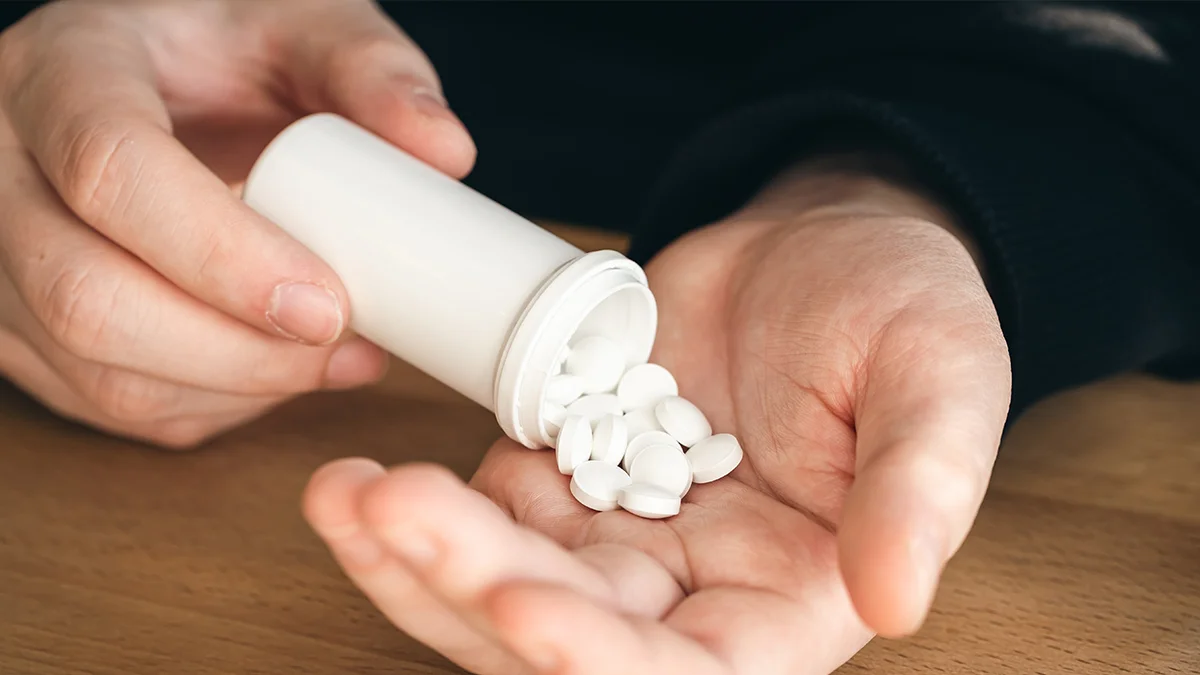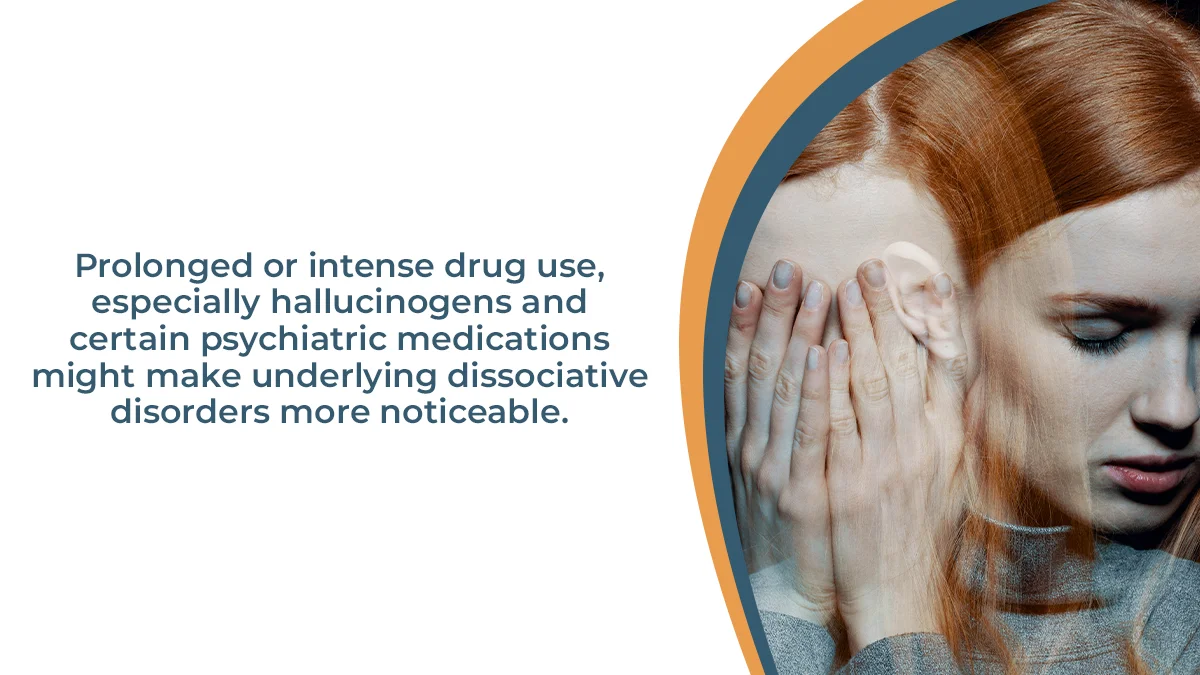
Using Tramadol To Manage Suboxone Withdrawal
Explore the role of tramadol in managing suboxone withdrawal symptoms with The Recovery Team-Newton.

Dissociative identity disorder (DID), characterized by the presence of two or more distinct personality states, has long intrigued researchers and the public alike. While its origins are complex and multifaceted, a question that often arises is whether drugs can induce or exacerbate this condition.
This inquiry delves into the interplay between substance abuse and DID, exploring the potential causal relationship and the underlying mechanisms. Understanding the intricate interplay between substance use and mental health is crucial for effective intervention and support for individuals experiencing dissociative symptoms.
Individuals with DID may be more vulnerable to substance abuse as a way to cope with their symptoms or traumatic memories. Here’s what you need to know:
Contact The Recovery Team-Newton at (508) 978-2772 for more information and recovery guidance on several medical conditions.
Dissociative identity disorder (DID), formerly known as multiple personality disorder, is a mental health condition where a person has two or more distinct identities. These identities control the person’s behavior at different times. Each identity has its name, history, and characteristics.
People with DID often experience gaps in memory and feel detached from themselves. The disorder is usually linked to severe trauma during early childhood, often extreme, repetitive physical, sexual, or emotional abuse.
From a psychological perspective, DID is a complex response to severe stress and trauma. The mind creates different identities to cope with the overwhelming experiences. These separate identities help the person to categorize and manage their pain.
Therapists often use talk therapy to help people with DID. In therapy, individuals can work through their traumatic memories and integrate their identities into one cohesive self. This process can take a long time and requires a supportive and understanding therapeutic environment. The goal is to help the person regain control over their life and reduce the distress caused by the disorder.
Neurologically, DID involves changes in how the brain functions. Studies using brain imaging techniques show that people with DID have different brain activity patterns when different identities are present. Certain brain areas may become more or less active depending on the identity that is in control. Researchers believe these changes help the brain manage trauma by separating painful memories from everyday awareness. Understanding these brain patterns can help scientists develop better treatments.
Drugs play a big role in mental health. Doctors use them to treat many mental illnesses. These drugs help balance chemicals in the brain. When the brain chemicals are balanced, people feel better and can think more clearly.
There are different drugs for different mental health problems. For example, some drugs help with depression, while others help with anxiety or psychosis. Taking the right drug can make a huge difference in someone’s life. It can help them live normally and do everyday activities.
Psychoactive drugs affect the mind. They change how we think, feel, and behave. There are several types of these drugs. Depressants, like alcohol and sleeping pills, slow down the brain. Stimulants, like caffeine and cocaine, make the brain more active.
Hallucinogens, like LSD and magic mushrooms, change how we see and hear things. Opioids, like painkillers and heroin, can relieve pain but are very addictive. Each type of drug affects the brain in different ways. Some are used as medicines, while others are illegal and harmful.
Substance abuse happens when people use drugs too much or in the wrong way. This can lead to many problems. People might get addicted, which means they can’t stop using the drug. Addiction can ruin lives. It can cause health issues, like heart disease or liver damage.
Substance abuse also affects families and friends. Relationships can suffer because of the person’s drug use. Jobs and schoolwork can be affected, too. People might lose their jobs or drop out of school. Substance abuse can also lead to legal troubles. It’s important to get help if someone is abusing drugs. Treatment can help them recover and lead a healthy life.
Drugs themselves do not directly cause dissociative identity disorder (DID). However, some drugs can trigger dissociative symptoms, which might mimic aspects of DID. These symptoms can include feeling detached from oneself or reality but are typically temporary.
Prolonged or intense drug use, especially hallucinogens and certain psychiatric medications might make underlying dissociative disorders more noticeable.
Theories about DID suggest that the disorder develops as a coping mechanism in response to extreme stress or trauma. People might dissociate when faced with unbearable situations, creating different identities to handle the pain.
Some researchers believe that certain drugs can exacerbate these dissociative tendencies. For example, drugs that affect the brain’s perception and consciousness might make a person more prone to dissociation. However, the primary cause of DID is still believed to be related to trauma, not drug use.
Several case studies and clinical research highlight the relationship between drug use and dissociative symptoms. For instance, patients with a history of trauma who use hallucinogens might experience an increase in dissociative episodes.
Clinical research shows that while drugs can trigger or worsen dissociative symptoms, they are not the root cause of DID. Treatment often involves addressing both the drug use and the underlying trauma.
Certain drugs can cause dissociative symptoms. Dissociation makes people feel detached from their surroundings or themselves. Drugs like hallucinogens, stimulants, and depressants can lead to these feelings. Each type of drug affects the brain in different ways, causing unique symptoms. Understanding how these drugs work can help people recognize and avoid the risks of dissociation.
Hallucinogens, like LSD and magic mushrooms, can make users experience intense dissociation. These drugs change the way the brain processes reality, leading to vivid hallucinations and altered perceptions of time and space.
People might feel outside their bodies or in a dream-like state. While some people seek these experiences for spiritual or recreational reasons, they can be frightening and disorienting. Long-term use can also lead to persistent mental health issues.
Stimulants, such as cocaine and methamphetamine, can trigger psychosis, which includes dissociative symptoms. These drugs increase the activity of certain brain chemicals, leading to heightened energy and alertness. However, high doses or chronic use can cause paranoia, hallucinations, and a sense of detachment from reality.
This drug-induced psychosis can be severe and may require medical treatment. Avoiding stimulants can help prevent these dangerous mental health effects.
Depressants, like alcohol and benzodiazepines, slow down brain activity. They can cause memory disruption and blackouts, making users unable to recall events that happened while they were under the influence.
These drugs affect the brain’s ability to form new memories, leading to gaps in memory and a sense of lost time. Misusing depressants can result in long-term cognitive problems and addiction. Staying aware of these risks can help individuals make safer choices regarding substance use.
Substance-induced dissociative states happen when someone uses drugs or alcohol. These substances can make a person feel disconnected from reality. DID happens when someone has two or more distinct identities. These identities control a person’s behavior at different times. DID is not caused by drugs but usually by severe trauma.
Substance-induced dissociative states start quickly after taking a drug or alcohol. Depending on the substance, they can last for a few hours or days. DID, on the other hand, develops over time, often starting in childhood. It can last many years, even a lifetime, if not treated.
Doctors use specific criteria to diagnose both conditions. For substance-induced dissociation, they look for recent drug or alcohol use and symptoms of dissociation. For DID, doctors look for signs of different identities and memory gaps.
Diagnosing DID can be challenging because it is often mistaken for other mental health issues. Substance use can also make it harder to diagnose DID because symptoms can overlap.
Treating substance-induced dissociative states usually involves stopping the use of drugs or alcohol. Therapy and support groups can help. For DID, treatment focuses on therapy. The goal is to integrate the different identities into one. Therapists use talk therapy to help patients process trauma and learn coping skills. Both conditions benefit from a supportive environment and professional help.
Getting the right diagnosis and treatment is important for recovery and improving quality of life.
Certain psychoactive substances, when abused or misused, can induce severe forms of dissociation, a type of dissociative disorder. This can lead to life-threatening disturbances and cause split personalities. Traumatic events, health conditions, or genetic predispositions may also play a role. Family members of individuals experiencing these symptoms should seek immediate help from healthcare professionals. It’s crucial to address these issues promptly to ensure the safety and well-being of the affected individual and their loved ones.
Childhood trauma and traumatic experiences, including sexual abuse and natural disasters, are major causes of dissociative identity disorder (DID). Symptoms include memory loss, dissociative fugue, and a fragmented sense of self. Mental health professionals diagnose and treat DID, often addressing co-occurring conditions like posttraumatic stress disorder and substance use disorders.
Treatment options may include therapy and medication. Seeking professional medical advice is crucial for individuals experiencing symptoms of dissociative disorders.
Certain recreational drugs, especially hallucinogens like ketamine and PCP, are more likely to induce dissociative symptoms. These symptoms can resemble dissociative disorders seen in medical conditions such as posttraumatic stress disorder or dissociative amnesia.
Those with a history of drug addiction, physical abuse, or mental health disorders are at heightened risk. Seeking information from medical professionals or healthcare providers is crucial, as severe forms of dissociation can be life-threatening. The American Psychiatric Association and medical providers offer resources for managing dissociative symptoms related to drug abuse.
Do you want to reclaim control and rediscover yourself? Whether you’re seeking stability, understanding, or empowerment, we’re here to support you every day.
Our comprehensive day treatment program, coupled with medication-assisted treatment(MAT), offers a holistic approach to beat mental health issues. Our skilled therapists utilize evidence-based therapies tailored to your unique needs, guiding you through each step of the recovery process with compassion and expertise.
Take the first step towards reclaiming your life – call us at (508) 978-2772 today and embark on a journey of healing and self-discovery.

Explore the role of tramadol in managing suboxone withdrawal symptoms with The Recovery Team-Newton.

Explore the basics of insurance coverage for suboxone treatment in this guide from The Recovery Team-Newton.

Explore the effectiveness of medication-assisted treatment with The Recovery Team-Newton.